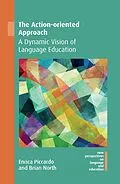This book presents the background to the current shift in language education towards action-oriented/action-based teaching, and provides a theorization of the Action-oriented Approach (AoA). It discusses the concepts and theories that paved the way for the AoA and explores their relevance for the way language education is conceived and implemented in the classroom. In the process, it revisits the concept of competence and discusses the dynamic notions of mediation and plurilingualism. The authors explain the way in which the Common European Framework of Reference for Languages (CEFR) and its recent update, the CEFR Companion Volume, broaden the scope of language education, in particular in relation to the actional turn. The book provides scholars and practitioners with a research-informed description of the AoA, explains its implications for curriculum planning, teaching and assessment, and elaborates on its pedagogical implications.
Autorentext
Enrica Piccardo is a Professor at the Ontario Institute for Studies in Education (OISE), University of Toronto, Canada; Head of the Centre for Educational Research in Language and Literacies (CERLL), OISE and Maître de conférences, Université de Grenoble-Alpes, France. She is a consultant for the Council of Europe.
Brian North is an independent researcher in language education. A long-time consultant for the Council of Europe, he co-authored the Common European Framework of Reference for Languages (CEFR) and the prototype European Language Portfolio.
Inhalt
Chapter 1. The Emergence of a New Paradigm
Chapter 2. The Notion of Competence: An Overview
Chapter 3. Towards an Action-Oriented Approach: Theoretical Underpinnings
Chapter 4. Preparing the AoA: Developments in Language Teaching Methodology
Chapter 5. The Common European Framework of Reference and its Companion Volume: A Paradigm Shift
Chapter 6. Towards a Dynamic Vision of Language Education: Plurality and Creativity
Chapter 7. The Action-Oriented Approach
Chapter 8. Conclusion
